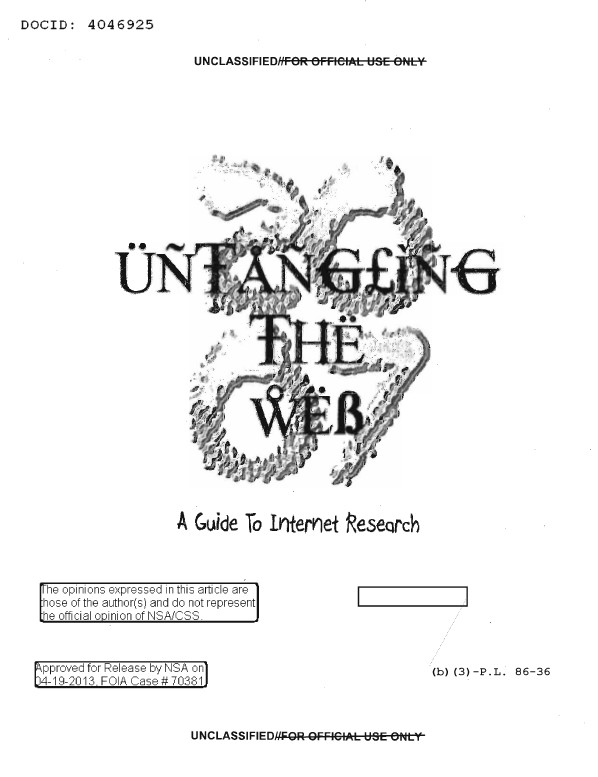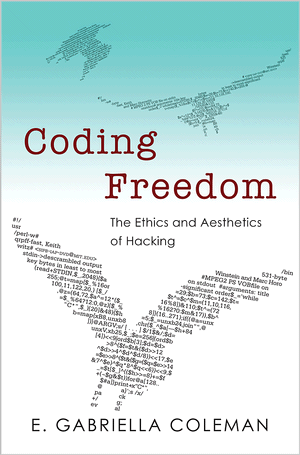National Security Agency: Untangling the Web: A Guide to Internet Research (2007)
Filed under manual | Tags: · google, hacking, internet, research, search, security, technology, web

“The manual just released by the NSA following a FOIA request filed in April by MuckRock. The book is filled with advice for using search engines, the Internet Archive and other online tools.” (source)
Publisher Center for Digital Content of the National Security Agency, February 2007
Unclassified in May 2013
643 pages
via Marcell Mars, via Wired
PDF (from NSA.gov)
PDF (mirror at the MuckRock website)
View online
Giovanni Ziccardi: Resistance, Liberation Technology and Human Rights in the Digital Age (2013)
Filed under book | Tags: · activism, censorship, crowdsourcing, cyberwar, facebook, hacking, hacktivism, human rights, internet, internet activism, liberation technologies, open data, politics, resistance, social media, surveillance, technology, transparency, twitter, wikileaks

This book explains strategies, techniques, legal issues and the relationships between digital resistance activities, information warfare actions, liberation technology and human rights. It studies the concept of authority in the digital era and focuses in particular on the actions of so-called digital dissidents. Moving from the difference between hacking and computer crimes, the book explains concepts of hacktivism, the information war between states, a new form of politics (such as open data movements, radical transparency, crowd sourcing and “Twitter Revolutions”), and the hacking of political systems and of state technologies. The book focuses on the protection of human rights in countries with oppressive regimes.
– Deals with digital resistance activities all over the world
– First book to describe political and human rights issues in Egypt, Tunisia, Cuba and Yemen
– A critical analysis of the WikiLeaks case
Publisher Springer, 2013
Volume 7 van Law, Governance and Technology series
ISBN 9400752768, 9789400752764
328 pages
via Marcell Mars via Jaromil
E. Gabriella Coleman: Coding Freedom: The Ethics and Aesthetics of Hacking (2012–) [EN, SC]
Filed under book | Tags: · aesthetics, anonymous, anthropology, code, computing, ethics, floss, free software, hacker culture, hacking, intellectual property, internet, internet activism, software, web

“Who are computer hackers? What is free software? And what does the emergence of a community dedicated to the production of free and open source software–and to hacking as a technical, aesthetic, and moral project–reveal about the values of contemporary liberalism? Exploring the rise and political significance of the free and open source software (F/OSS) movement in the United States and Europe, Coding Freedom details the ethics behind hackers’ devotion to F/OSS, the social codes that guide its production, and the political struggles through which hackers question the scope and direction of copyright and patent law. In telling the story of the F/OSS movement, the book unfolds a broader narrative involving computing, the politics of access, and intellectual property.
E. Gabriella Coleman tracks the ways in which hackers collaborate and examines passionate manifestos, hacker humor, free software project governance, and festive hacker conferences. Looking at the ways that hackers sustain their productive freedom, Coleman shows that these activists, driven by a commitment to their work, reformulate key ideals including free speech, transparency, and meritocracy, and refuse restrictive intellectual protections. Coleman demonstrates how hacking, so often marginalized or misunderstood, sheds light on the continuing relevance of liberalism in online collaboration.”
Publisher Princeton University Press, 2012
Creative Commons Attribution-NonCommercial-NoDerivs 3.0 License
ISBN 1400845297, 9781400845293
264 pages
Responses: Jo Bates, Denisa Kera, Brett Lunceford, Jorge Luis Zapico, Alexander Halavais, Stéphane Leman-Langlois, Ethan Zuckerman
Reviews: James Grimmelmann (Jotwell: Cyberlaw, 2012), David Banks (Cyborgology, 2012), Eric Raymond (2013), Cade Metz (Wired, 2013), Mike Doherty (Hashbang, 2013), Bruce Byfield (Linux Mag blog, 2013), Bryan Behrenshausen (OpenSource.com, 2013), Roy S. Gutterman (Journalism & Mass Communication Q, 2014), Tim Jordan (American J Sociology, 2014), Emily T. A. Earl (Techno_ethno, 2014), Anne Elizabeth Yaniga (Techno_ethno, 2014), Sebastian Kubitschko (Culture Machine, 2014).
Coding Freedom (English, updated on 2013-1-18, PDF, EPUB [updated on 2014-9-2])
Kodiranje slobode. Etika i estetika hakovanja (Serbo-Croatian, trans. Ljubica Gotić and Predrag Todić, 2014)

